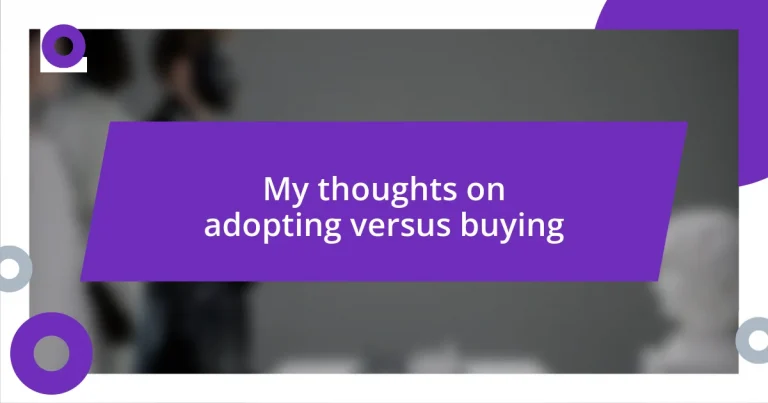Key takeaways:
- Adoption provides a second chance for pets, supports shelters, and often comes with lower initial costs due to vaccinations and spaying/neutering.
- Buying a pet allows for specific breed selection, health guarantees, and typically includes early training and socialization from breeders.
- Both adoption and buying involve long-term commitments with emotional, lifestyle, and financial considerations that should be carefully evaluated before making a choice.
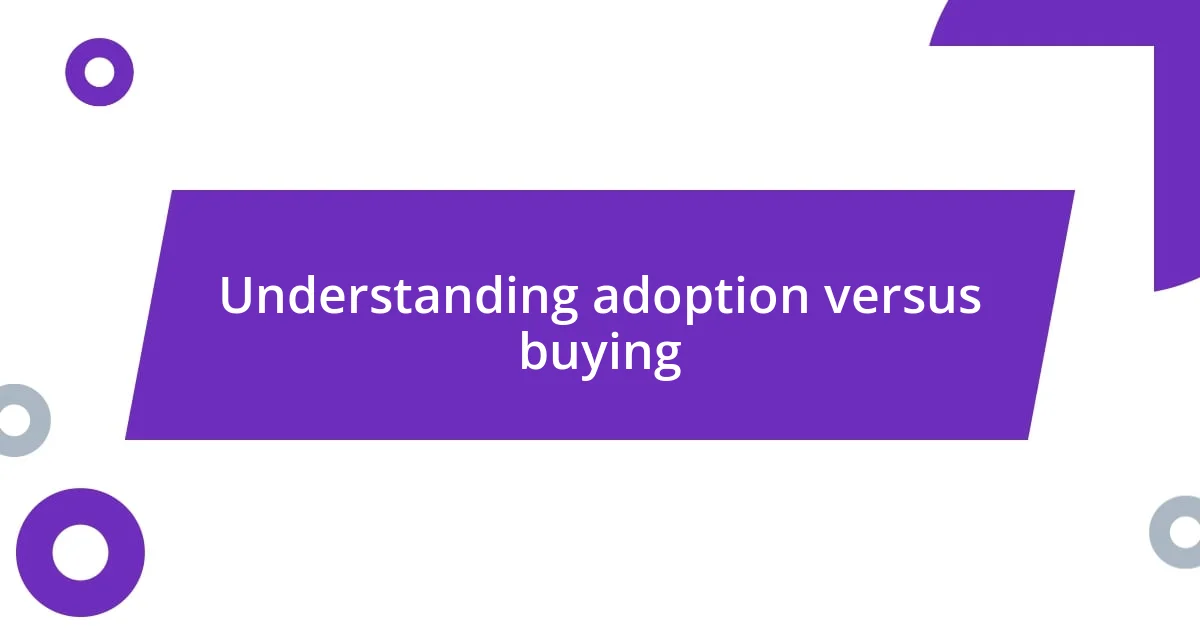
Understanding adoption versus buying
When it comes to adopting versus buying a pet, the decision often hinges on individual values and circumstances. I remember the excitement I felt when I first walked into an animal shelter, and the overwhelming sense of connection I had with the animals there. Can you imagine the joy of giving a home to a creature that desperately needs one?
Adoption typically supports shelters and rescues, giving abandoned pets a second chance. I’ve witnessed the transformation of a timid rescue dog who blossomed into a loving companion once he realized he was safe and cared for. It’s a powerful reminder of how crucial it is to choose adoption—not just for the animal, but for ourselves, as we gain a loyal friend with a unique story.
Buying a pet, on the other hand, can often mean choosing a specific breed with desired traits. While I get that appeal, I often wonder—are we really considering the larger implications? Each scenario reflects our priorities in responsible pet ownership, but the emotional rewards of adopting an animal in need are truly unmatched.
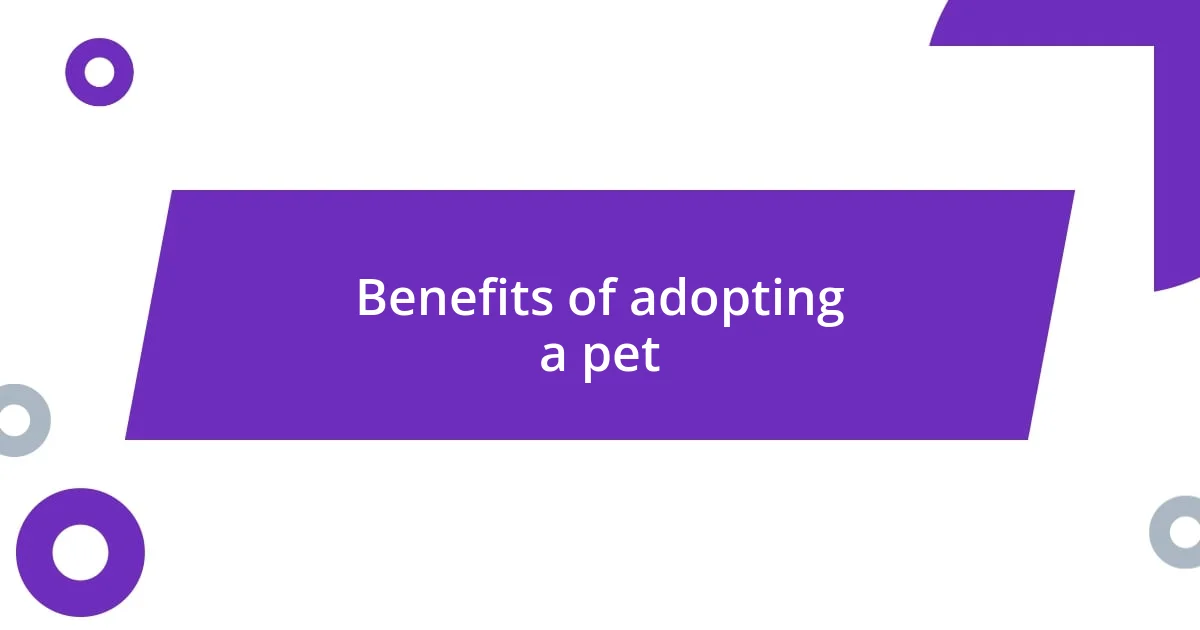
Benefits of adopting a pet
Adopting a pet can be one of the most rewarding experiences. When I adopted my cat from a rescue, I realized that I wasn’t just gaining a furry companion; I was also providing her with a loving home where she truly belonged. There’s something incredibly fulfilling in knowing that, with your choice, you’ve given a second chance to a creature who truly needed it.
Another remarkable aspect of adoption is the direct impact it has on the community. Each time someone chooses to adopt rather than buy, they’re helping to alleviate overcrowding in shelters. I once spoke with a shelter volunteer who shared heartwarming stories of families that found their perfect match in the most unexpected ways, proving that love often blooms in places we least expect.
Moreover, many shelters offer pets that are already spayed or neutered and sometimes even vaccinated. This means that the upfront costs can be significantly lower than buying from a breeder. I fondly remember the day I brought my rescue dog home; not only did I save money, but I also gained an immeasurable amount of joy. It’s amazing how adopting opens a door to a world of companionship while simultaneously doing a good deed.
| Benefit | Description |
|---|---|
| Providing a second chance | Adoption gives pets a new lease on life, allowing them to thrive in loving homes. |
| Community impact | Adopting helps reduce the number of homeless animals and supports local shelters. |
| Lower costs | Many adopted pets come vaccinated and spayed/neutered, reducing initial expenses. |
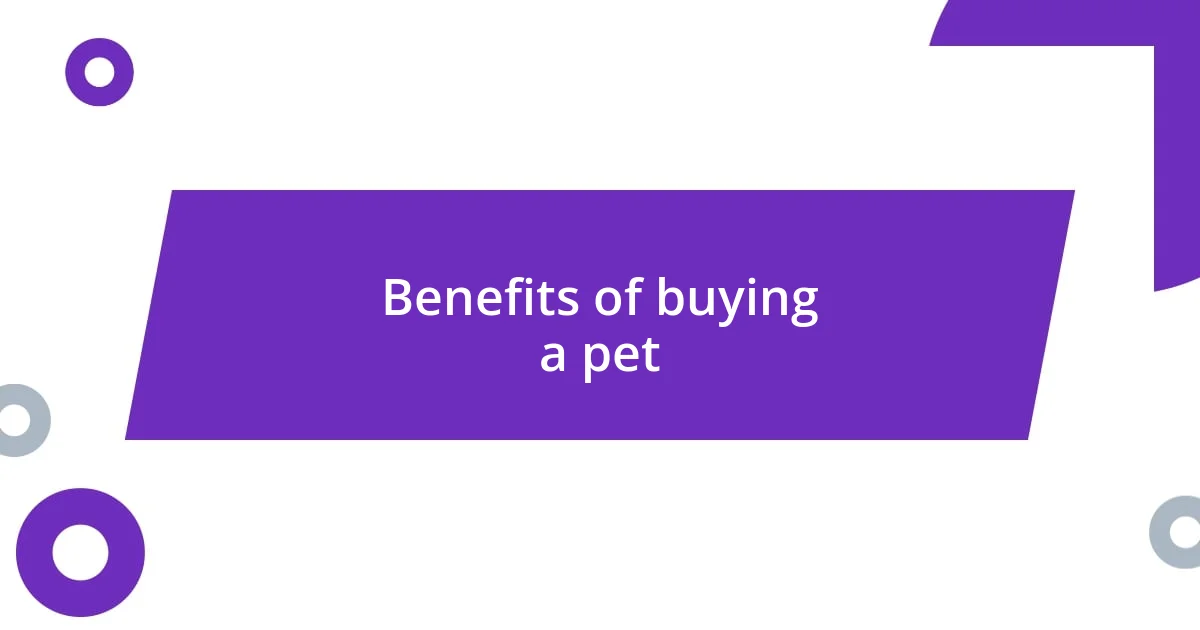
Benefits of buying a pet
Buying a pet offers a different set of benefits that can be truly appealing, especially when searching for a specific breed. I remember when I decided to bring home a purebred dog after researching its traits and temperament. It felt exhilarating to know exactly what kind of personality and energy level I was welcoming into my home. This clarity can lead to a smoother integration within the family, as well as a more predictable relationship with your pet.
Here are several benefits of buying a pet:
- Specific Traits: You have control over the breed and can select one that aligns with your lifestyle, whether it’s a high-energy dog for outdoor adventures or a calm cat for relaxation.
- Health Guarantees: Reputable breeders often provide health clearances and background on genetic history, which can give peace of mind regarding potential future health issues.
- Training and Socialization: Many breeders start socialization and training, making it easier for new pet owners to continue and build upon that foundation.
As I watched my purebred dog settle into our routine, I couldn’t help but appreciate the predictability in her behavior—qualities I had hoped for and confirmed with the breeder. Each wag of her tail felt like the culmination of thoughtful planning, adding a unique joy to our lives. It’s that personal connection, formed through a choice based on understanding what we wanted, that makes buying a pet a worthwhile consideration.
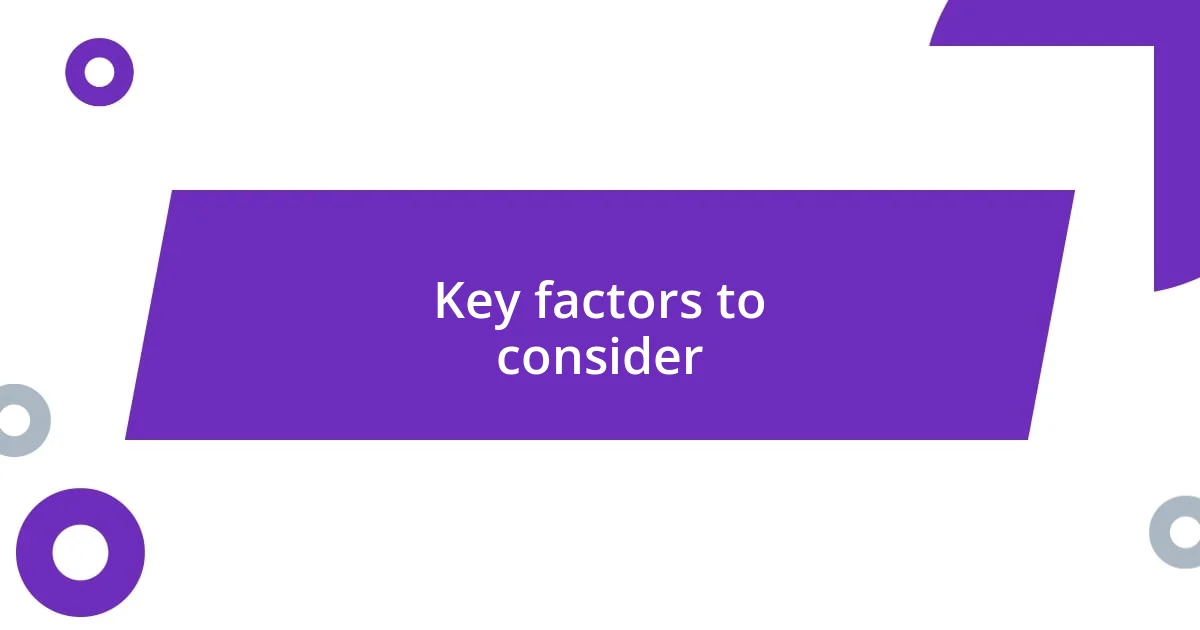
Key factors to consider
When considering whether to adopt or buy, one of the first factors to reflect on is your lifestyle and preferences. For instance, I remember having a friend who had an active lifestyle filled with hikes and outdoor adventures. Initially, she thought about adopting a pet but realized she needed a specific breed that matched her energy level. It made me wonder—how do our daily habits influence our choice of a furry companion?
Another key factor is the long-term commitment involved in pet ownership. I often think about the responsibilities I took on when adopting my first dog. It wasn’t just about cuddles and playtime; it meant understanding her needs, training, and health care. If you’re contemplating this decision, ask yourself: Am I ready for the associated lifelong responsibilities and nuances of each option?
Lastly, consider the emotional aspects of adopting versus buying. There’s a unique sense of fulfillment in adopting a pet in need, which was an undeniable part of my experience. Each time I see my adopted cat lounging happily, I feel a twinge of pride knowing I changed her life for the better. Yet, I also understand the joy a well-bred puppy can bring, especially one that fits seamlessly into a family’s fabric. Have you thought about what emotional journey you want to embark on with your new companion?
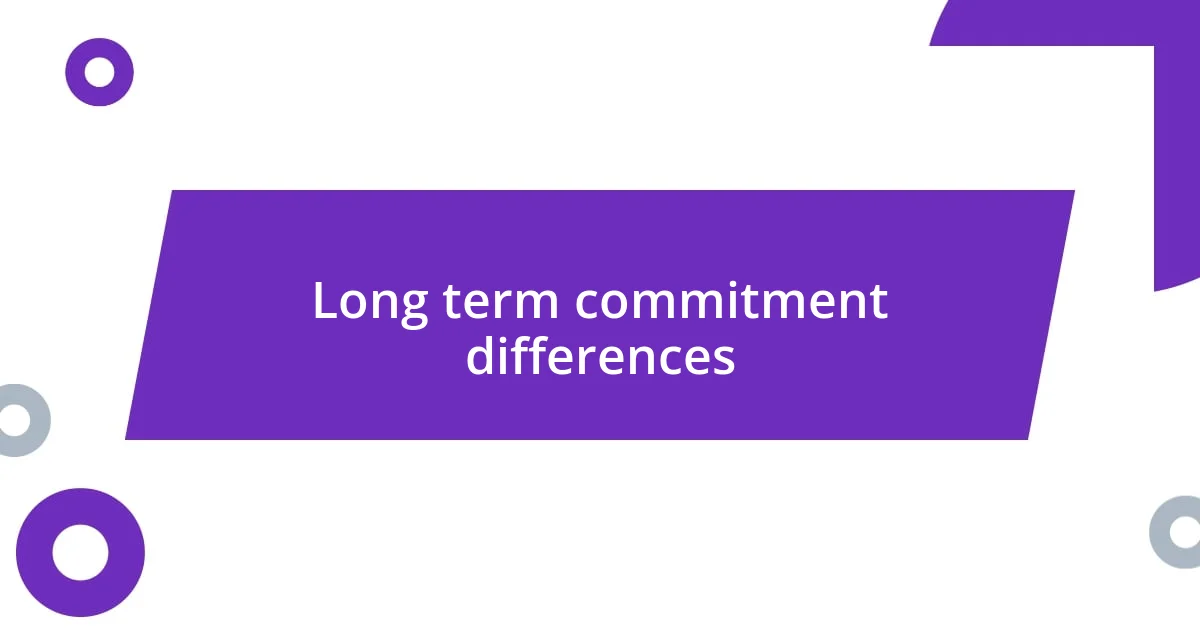
Long term commitment differences
When you choose to adopt, the commitment often involves understanding the baggage that some pets carry. I vividly recall the first time I adopted a rescue dog. Initially, I was thrilled, but I soon realized he needed extra time and patience due to his past experiences. This meant long-term training and ongoing emotional support, which transformed our lives in unexpected ways. Are you ready to invest that kind of energy into healing a broken spirit?
On the flip side, buying a pet can mean a different kind of commitment. I’ve spoken with friends who bought puppies and felt they had a blank slate to work with. They raved about how they could mold their new pet’s personality through training and socialization right from the start. However, this type of relationship also requires constant nurturing and education to maintain that desired energy and behavior, leading me to wonder—how adaptable are you to changing circumstances in a pet’s life?
Ultimately, the long-term commitment you make can set the tone for your pet’s well-being and your experience as an owner. I learned this when I decided to invest in an enrichment program for my adopted dog, realizing too late that his early shyness required additional careful attention. Have you considered what your own lifestyle can accommodate—will it be a nurturing hand in the trenches of adoption or a straightforward companionship built on chosen traits?
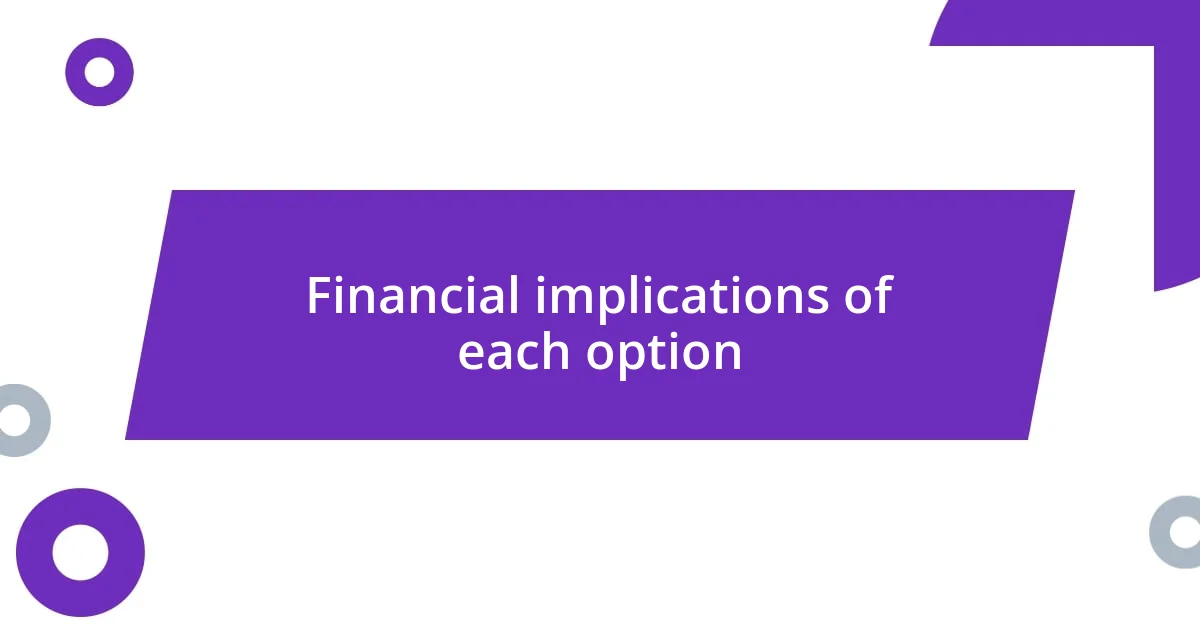
Financial implications of each option
The financial implications of adopting versus buying a pet can be quite distinct. Adopting typically includes a one-time fee that often covers initial vaccinations and spay or neuter costs, which makes it a more budget-friendly option right from the get-go. However, I remember when I adopted my dog; while the initial costs were low, I soon realized that ongoing veterinary bills and specialized food could add up quickly as some rescue pets come with health issues. Have you factored in how much you’re willing to spend on both immediate needs and long-term care?
On the other hand, buying a pet, especially from a breeder, usually entails a higher upfront cost. I learned from a friend who bought a purebred puppy that the purchase price was just the beginning. She had budgeting concerns when it came to grooming, training, and potential health tests specific to the breed. It prompted me to wonder—how important is it for you to invest in a breed that could potentially require frequent visits to the vet?
When considering these financial aspects, it’s wise to think about the hidden costs as well. While my adopted cat seemed inexpensive at first, I found that investing in behavioral training and premium food was essential to her well-being. What’s your plan for dealing with unplanned expenses? There’s always a chance that, regardless of your choice, you might encounter unexpected veterinary emergencies that could impose considerable stress on your wallet. Balancing initial costs with ongoing financial responsibilities can be a true game changer in your pet ownership journey.












